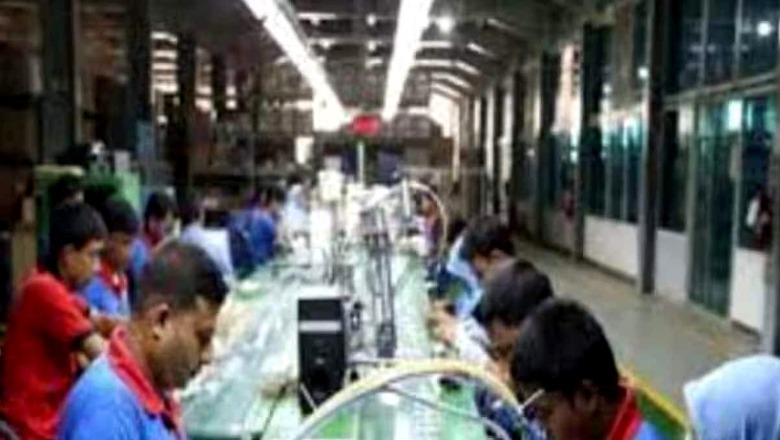
views
India, a country rich in varied cultures and customs, has emerged as an industrial powerhouse. The country’s manufacturing industry, which has a long history spanning centuries, has seen a remarkable metamorphosis, expanding into a number of industries and being crucial to the country’s economic growth.
India’s primary manufacturing sectors cover a diverse range of industries, each of which has its own distinctive traits and economic benefits. From minerals to information technology, from textiles to automobiles, India has a thriving and active manufacturing sector that serves both home and foreign markets.
In this week’s Class with News18, we are discussing the major manufacturing industry of India, and their impacts on the economy as well as the environment.
Agro-based Industries: Nourishing India’s Economy
Given the nation’s deep agricultural origins, agro-based sectors are essential to India’s economic landscape. These sectors are crucial to the nation’s economic structure since they are closely related to the production and processing of agricultural goods. The value of agricultural products is greatly preserved and increased by the food processing sector. Food products, such as grains, fruits, vegetables, and dairy products, are processed and packaged as part of this process.
Food processing, vegetable oil, sugar, cotton, and textiles are a few significant agro-based categories. The manufacturing of textiles has a long and illustrious history in India. One of the biggest employers in the nation, the textile sector employs both skilled and unskilled employees. Both local and foreign markets are served by major textile centres including Surat, Ahmedabad, and Tirupur.
Mineral-based Industries: India’s Natural Wealth
Mineral-based industries constitute a vital part of India’s economic landscape owing to the country’s abundant mineral reserves. The mining industry involves the extraction of important materials such as coal, iron ore, and bauxite. These raw materials are subsequently processed by the metallurgy industry to produce finished goods like steel and aluminium, which are crucial in construction and infrastructure. Mineral-based industries focus on the mining and processing of mineral resources, which taps into India’s tremendous geological wealth.
Automobile Industry
India has experienced a staggering expansion in the automobile industry over the past two decades. It covers the production of automobiles, motorbikes, and commercial vehicles as well as the components that constitute such vehicles. Additionally, several Indian automobile companies have made major advancements both domestically and internationally in terms of market presence.
Increasing consumer demand, technical developments, and initiatives from the government have all contributed to this industry’s noteworthy expansion. A huge network of suppliers, dealerships, and service facilities are supported by the automotive industries, which supports numerous employment opportunities for individuals.
Electronics and Information Technology Industries
The electronics and information technology (IT) business in India is a fast-rising industry that is critical to the country’s financial landscape. It includes the manufacture of electronic items, designing and developing software, and IT services. India has established itself as a worldwide IT outsourcing centre with cities such as Bengaluru, Mumbai, Delhi, Hyderabad, Pune, Chennai, Kolkata, Lucknow, and Coimbatore being significant locations for the production of electronic goods. With programmes like “Make in India,” the electronics manufacturing industry has also experienced significant expansion.
Impact of these manufacturing industries on India’s economy
Manufacturing industries are critical to the Indian economy, contributing significantly to its GDP. Their expansion triggers an economic domino effect that benefits several industries. Furthermore, these sectors are major job creators, employing millions of professional and unskilled employees. This is especially important when it comes to combating unemployment and eliminating poverty.
India’s exports are also significantly influenced by sectors including textiles, food processing, IT and automobile, which helps to close trade gaps and strengthen foreign exchange reserves. The creation of essential infrastructure, such as roads, bridges, and buildings, especially those for the steel and automobile industries, also contributes to the expansion of the broader economy.
Environmental Challenges
Economic growth is significantly influenced by the manufacturing sector. However, they have important environmental repercussions that go hand in hand with their relevance. Pollution is among the top issues. Pollutants from these industries are frequently released into the air, water, and soil, severely degrading the ecosystem. Resource depletion is a further urgent problem. Mineral-based enterprises in particular need enormous quantities of energy, water, and other natural resources. Hence, overexploitation can lead to scarcity of these resources as well as long-term detrimental effects on the environment.
The positive outlook is that many sectors are increasingly supporting green projects and sustainable and ethical practices. Therefore it’s important to recognise the importance of governmental rules and laws protecting the environment. These rules are critical in minimising the detrimental impact of manufacturing businesses, and compliance with them is required for long-term growth. In essence, the manufacturing sector has enormous economic potential, but a harmonious relationship between industry and the environment is critical for a sustainable future.

















Comments
0 comment